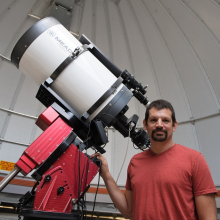A fresh remedy for anxiety
Compound found in avocados and almonds could potentially reduce anxiety
Briefs

A natural, plant-derived substance found in abundance in avocados may help reduce anxiety without the negative side effects often associated with neuropsychiatric drugs, according to a Weizmann Institute study. The research group of Prof. Mike Fainzilber, from the Department of Biomolecular Sciences and the newly formed Department of Molecular Neuroscience found that the substance, beta-sitosterol, reduced anxiety in mice both by itself and in combination with antidepressant medication. The findings appeared in the journal Cell Reports Medicine in May.
Treating anxiety has long been fraught with challenges. Because the brain circuits for anxiety link closely to circuits underlying memory and general awareness, many current anti-anxiety medications can cause unwanted memory loss and “brain fog.” So scientists continue to seek better options.
The Fainzilber team surveyed genomic databases to find existing compounds that mimic genes whose expression helps induce calm. This work—based on prior Fainzilber lab research on proteins and genes associated with stress—led the team to beta-sitosterol, which is found in almonds, pistachios, various grains—and especially in avocados. Beta-sitosterol induced a marked decrease in anxiety in mouse studies when given alone or in combination with the known antidepressant fluoxetine (Prozac), and more importantly, this was not accompanied by side effects often associated with anti-anxiety medication.
But it isn’t enough to just eat avocadoes, says Dr. Nicolas Panayotis, a senior intern in the lab of Prof. Fainzilber, who led the study. “You would need to eat avocado day and night to get the right dose.” The next step would be a clinical trial to test the use of beta-sitosterol for reducing anxiety in humans.
—by Anne Sperling
Prof. Mike Fainzilber is supported by the Chaya Professorial Chair in Molecular Neuroscience, the Dr. Miriam and Sheldon G. Adelson Medical Research Foundation, Miel de Botton, the Laraine and Alan A. Fischer Laboratory for Biological Mass Spectrometry, the Moross Integrated Cancer Center, and the Weizmann-Brazil Center for Neurodegeneration Research.








